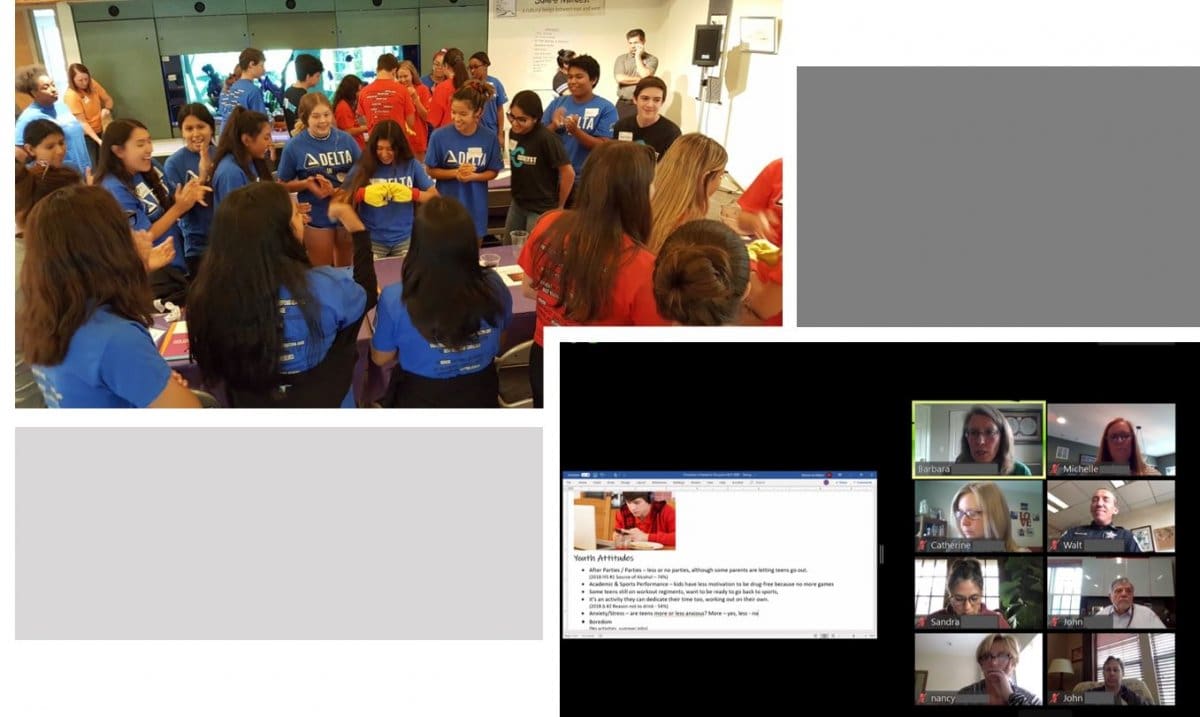
“Community – The Anti-Drug (CTAD) is a collaborative coalition in the cities of Highland Park and Highwood, and the villages of Bannockburn, Deerfield and Riverwoods, Illinois,” said the coalition’s Program Coordinator Catherine Spencer. “These suburbs are located approximately 26 miles north of Chicago. Highland Park and Highwood sit along the shoreline bluffs of Lake Michigan, providing scenic views for affluent members of these communities. While the communities have a majority of affluent, highly educated families, there are pockets of lower income families. These five communities combine to create one high school district, Township High School District 113, which is comprised of two high schools, Deerfield High School and Highland Park High School. CTAD strives to build and sustain a safe and healthy community in which our youth feel protected, confident and empowered to make drug-free choices. We want to transform the environment around our youth so that the drug-free choice is the easy choice. Our coalition was formed on December 30, 2014.”
“Our coalition is following a few special protocols to continue our work during the COVID-19 pandemic,” said Spencer. “All staff are working from home and learned how to utilize technology like Zoom and Google Hangouts to communicate, and we have suspended all in-person meetings and canceled participation in all in-person events through the end of the summer. All meetings have moved to video conference.”
“The time our coalition would have spent planning for summer festivals is now being used to assess the impact the pandemic may have on youth drug and alcohol use and develop strategies specific to this climate,” said Spencer. “Since people are spending more time online, we increased our social media presence. We continue to post drug-related information and are now also sharing the many resources being offered by our community partners for the overall well-being of both our youth and community as a whole. This includes tips for parenting in a pandemic, resources to help pay rent and online local library services. We also created a special version of our logo with people physically distanced and wearing face masks. This visually shows CTAD’s support to help our community stay healthy during this time.”
“To keep our virtual meetings meaningful and engaging, we have reduced our meetings from and hour and a half to one hour,” said Spencer. “In an effort to assess the impact of the pandemic on youth alcohol and marijuana use in our community, our first virtual meeting included a guided, interactive group discussion which explored how known root causes and the local conditions on our logic model have changed and might change moving forward. This assessment resulted in two new initiatives being planned for the summer to address local conditions created by Illinois’s stay at home order.”
“There was an initial adjustment period in the first few weeks of late March/early April, during which time most of our coalition’s committees chose to cancel their meetings,” said Spencer. “Since we began to hold meetings virtually, we have actually experienced higher participation than usual. While some of our community leaders, school administrators and law enforcement officers are too busy to join the meetings, others who have not been able to come to meetings in the past are now attending due to a more flexible schedule, more time and/or accessibility of the online meetings.”
“Our youth-focused efforts during this time have included Youth Advisory Board video conference meetings and accepting applications for 2020-2021 as a google form and through email,” said Spencer. “Our students have taken on the efforts of writing ‘QuaranTEEN Survival Tips’ for our parent e-newsletter, recording video PSAs on their phones, developing a document with pandemic survival tips for their peers and more.”
“For our adult members, our Parent Committee has discussed changing the priority of our interventions,” said Spencer. “Because alcohol sales have increased nationally and parents indicate that they are drinking more due to stress during the pandemic, the committee determined to focus on reminding parents to secure and/or monitor both alcohol and marijuana in the home. Efforts will include providing local alcohol retailers with signage, articles in the next parent e-newsletter and social media posts. Our Evaluation Committee has also been collecting parent surveys and coalition member engagement surveys online.”
“As a result of our efforts, participation at our April coalition partners meeting increased by 26% compared to last April’s meeting,” said Spencer. “Participation in our online high school Parent Survey has increased 213% compared to last year, and by the end of May, all committees have met at least once using video conference technology.”
“We have been challenged to think of new ways to continue our current work and also take a step back to assess what work is a priority and if local conditions have been impacted by the pandemic,” said Spencer. “For example, one of our local conditions was that youth leave school-sponsored dances/activities for after parties with alcohol. Currently, there are no school-sponsored dances or activities. With input from our coalition, we determined that we shouldn’t focus on this local condition in our current environment.”
“I would advise other coalitions to also re-assess the community needs at this time, and do it quickly,” said Spencer. “You may identify some temporary local conditions or want to prioritize different strategies. In order to move quickly, gather whatever qualitative and quantitative data is easily accessible. Consider consulting neighboring coalitions or use the CADCA Community to request resources and strategies from similar communities. You may need to expand your mission during the pandemic and look for opportunities to utilize your coalition’s capability to connect many community organizations. This is a great time to build your relationship with organizations by supporting their work and using your media channels to share resources and information.”


